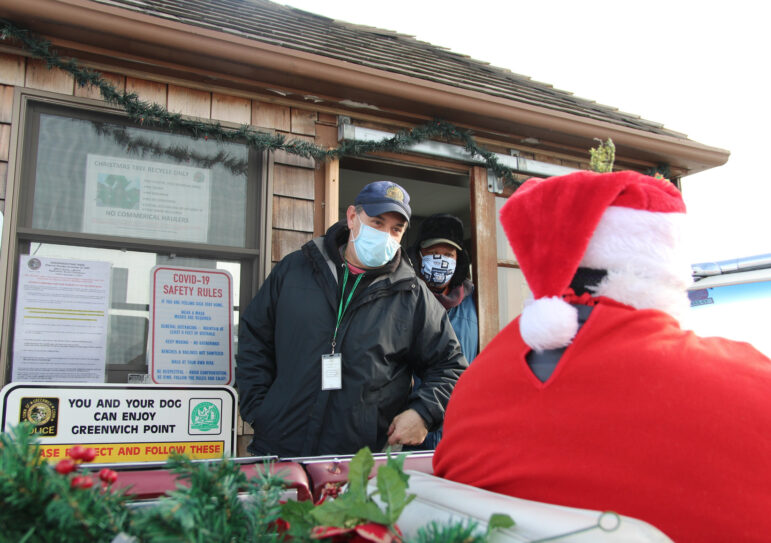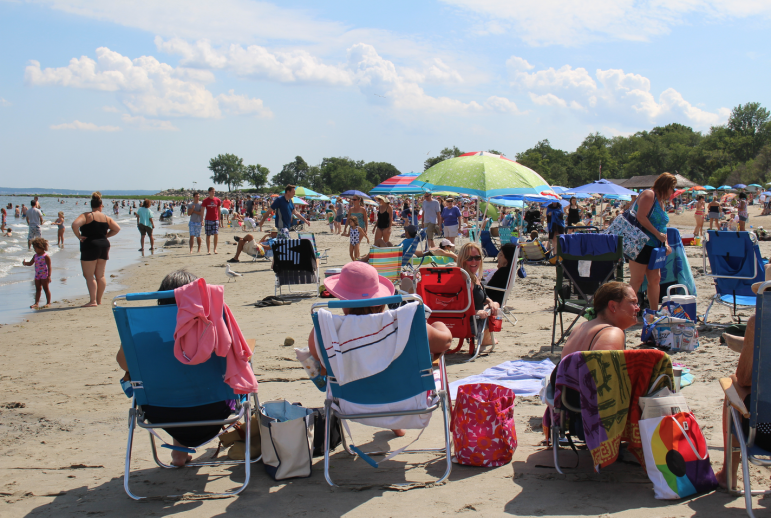After a raft of zoning legislation was considered by the Connecticut’s Planning and Development Committee this week, the focus of many Connecticut headlines was on SB 1024, “the DeSegregate CT” bill.
But on March 31, the last bill on the list, item no. 25, had to do with the state’s public beach access.
The original bill 6351 proposed by Democratic State Rep Roland Lemar, who represents East Haven and New Haven, would have immediately prohibited beach access fees based on residency and stopped towns from banning non residents from access in response to the Covid-19 pandemic.
Some towns did close their beaches to non residents because of the pandemic including Fairfield and Greenwich. Both towns said it made it easier for people to social distance.
In committee, beach access bill was downgraded to a study – HB 6642 An act concerning a study of access to municipal owned beaches and parks adjacent to marine or tidal waters. It was voted on unanimously on March 31.
By law, Connecticut’s shoreline is public property up to the high tide line.
Rep Lemar said he was frustrated the bill was downgraded, and vowed to bring it back next year.
While the country continues to have institutionalized racism top of mind, and Ms Bronin from Hartford said DeSegregate CT was an initiative that grew out of the George Floyd protests last summer, Representative Jack Hennessy, a Democrat representing Bridgeport, said during remarks on the beach bill that he viewed beach access as a Black Lives Matter issue.
“There are populations in our country and in our state that are not being given the rights they deserve and are entitled to. Especially after being in quarantine for a year,” Rep Hennessy said. “It should be a right for everyone.”

Rep Steve Cassano, (D-4) representing Andover, Bolton, Glastonbury and Manchester, said he’d recently been in Nantucket where despite the presence of mansions, there was public access points to the beach every 1/4 mile.
“I understand that communities put in their own dollars, but we put in a lot more at the state and federal level,” Cassano said. “We do have the big beaches like Hammonasset, but we’re really talking about beach access.”
Beach towns like Greenwich also say they pay significant local tax dollars for beach maintenance.
But Rep Lemar said one town in Connecticut had received millions of dollars in both federal and state relief for their shorelines after Hurricane Sandy, in addition to millions in shoreline stabilization funds.

Leaders from beach towns in the southwest of Connecticut have argued that the issue is over limited parking.
In Greenwich, the main beach at Tod’s Point in Old Greenwich is accessed by a narrow causeway and a much smaller beach at Byram Park. There is also Island Beach, accessed by a seasonal ferry boat.
On a nice weekend in July, the parking lot at Tod’s Point reaches capacity and residents are turned away.
Though Lemar did not bring up Greenwich specifically, choosing instead to single out Westport, in Greenwich, non residents are allowed to come to Greenwich beaches for a higher fee than residents.
The town settled a lawsuit in 1994 with Brenden Leydon of Stamford who had been turned away at the Tod’s Point gatehouse in 1994 during a jog because he was not a resident.
After the Court issued its ruling, Greenwich created a fee structure that was deemed reasonable under the Supreme Court ruling.
Non residents pay per car in addition to a per person fee. In the summer out-of-state license plates are a feature in the beach parking lots.

Rep Lemar said, “The challenge we have is that the beach itself is fully public land up to the mean high tide line. The access to that beach is what is restricted.”
“The vast majority of our shoreline is privately owned,” Lemar said. “That which is publicly owned is often off limits to anyone who does not live in the specific community.”
Lemar said Westport had received millions of dollars in both federal and state relief for their shorelines after Hurricane Sandy, and received millions in shoreline stabilization funds, yet they charge non residents $750 for a season pass to access their beach. Meanwhile they charge their local residents $25.

Republican State Senator Tony Hwang whose district includes both beach towns and non-beach towns, said, “I know it’s a deeply emotional issue, just as zoning is.”
“What we’re really talking about is parking. Not to access the beach,” Hwang added. “I’m going to share that I have the challenge in my district I have two coastal towns, but also other communities that would not be able to benefit and utilize those beaches.”
“In the demonstration of the collaboration and goodwill and desire to find solutions I will be voting yes on this study and work to find solutions with advocates on both sides of the issue,” he said, adding that he was going to end his remarks with “a good Kum ba yah moment.”
Committee chair Cristin McCarthy Vahey (D-133) thanked Rep Lemar for bringing up a topic that she said was “not politically popular.”
The vote was unanimously in favor of the bill which will require a study of towns in CT with beaches, including their fee structures.
See also:
Controversial SB 1024 Zoning Bill Moves Favorably Out of Committee
A;pril 1, 2021
Bill Would Prohibit Greenwich from Charging More to Non Residents for Beach Access
February 2021